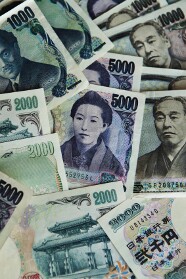The Japanese yen is falling against several major currency competitors on Tuesday as the central bank dismissed recommendations for further monetary easing amid the Wuhan coronavirus outbreak. After the Peopleâs Bank of China (PBoC) employed 30 stimulus measures, some analysts had expected the Bank of Japan (BoJ) to follow suit since its economy is anticipated to slump from the virus. New manufacturing data also hurt the yen.
Speaking in front of the Parliament, central bank head Haruhiko Kuroda told lawmakers that it is too early to institute any monetary policy instruments in response to the coronavirus. Kuroda did confirm that the BoJ will pay âmaximum attentionâ to the outbreakâs impact on financial markets and the worldâs third-largest economy.
In the meantime, Kuroda told Tokyo that the central bank is gathering as much information as possible and would share it with other financial institutions at international meetings.
China plays an integral part of the Japanese economy. Beijing is Japanâs second-largest export destination and the Chinese account for nearly one-third of all tourists visiting Japan.
Like China, the timing of the coronavirus comes at a bad time for Tokyo. The nation is still reeling from a sales tax hike that has cut into consumer spending. It is estimated by officials that the gross domestic product in the fourth quarter of 2019 and first quarter of 2020 will take a hit, mostly from the coronavirus. Also, Tokyo is hosting the Summer Olympics this summer, so that is something else to consider.
The coronavirus has paralyzed China. The death toll has risen to 426 and there have been more than 20,000 confirmed cases. The federal government announced that it would permit US medical experts to enter the country and investigate the crisis. Many reports suggest that the government is suppressing the real data and severity of the virus.
On the data front, the Jibun Bank manufacturing purchasing managersâ index (PMI) came in at 48.8 in January, up from 48.4 in December. The market had penciled in a reading of 49.3. The PMI has been in contraction mode since May of last year.
The USD/JPY currency pair rose 0.42% to 109.19, from an opening of 108.69, at 13:36 GMT on Tuesday. The EUR/JPY advanced 0.29% to 120.58, from an opening of 120.18.
If you have any questions, comments, or opinions regarding the Japanese Yen, feel free to post them using the commentary form below.
Japanese Yen Slips As BoJ Dismisses Further Easing Amid Coronavirus
